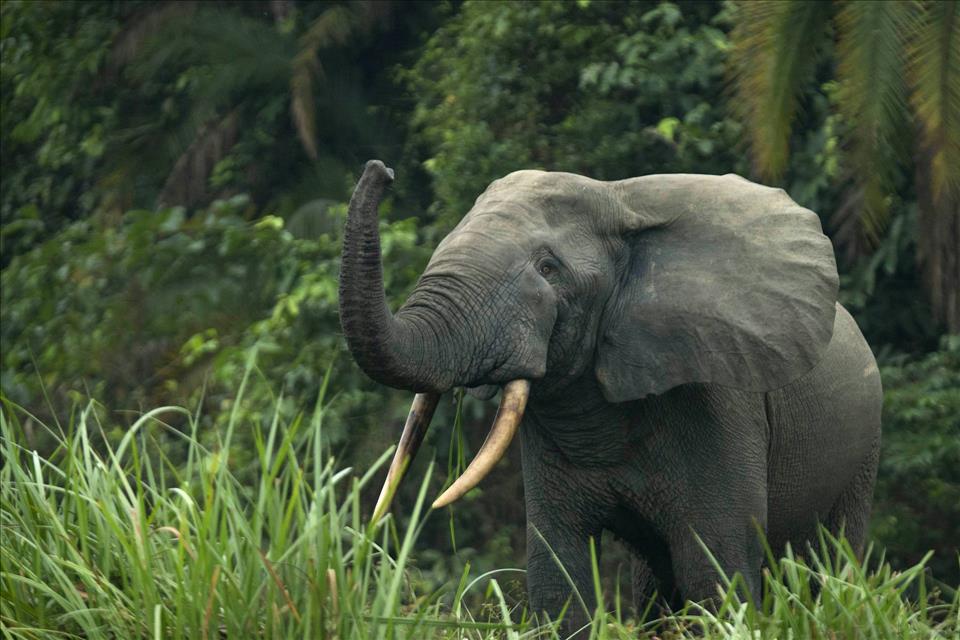
Nigeria's Last Elephants What Must Be Done To Save Them
The International Union for Conservation of Nature (IUCN) recently classified the forest elephant as “critically endangered” and the savanna elephant as“endangered” .
The country has never had herds in the multiple thousands, but its elephants have played a vital ecological role, balancing natural ecosystems .
Today they live primarily in protected areas and in small forest fragments where they are increasingly isolated and vulnerable to extinction. They are found in Chad Basin National Park in Borno State and Yankari Game Reserve in Bauchi State. Also in Omo Forests Reserve in Ogun State, Okomu National Park in Edo State and Cross River National Park in Cross River State.
Elephants in Nigeria are threatened by habitat loss and fragmentation, poaching and illegal ivory trade, human-elephant conflict and climate change. These issues are pushing them to the brink of extinction.
In August 2024 Nigeria launched the country's first National Elephant Action Plan. The 10-year strategic plan aims to ensure the long-term survival of elephants in Nigeria.
But will it?
As a conservationist with research in elephant conservation , I think this plan is a promising initiative. It could ensure the survival of Nigeria's elephants. However, the long-term sustainability of the elephant populations in Nigeria depends on how well the plan balances conservation efforts with economic development. The government must also be willing to support the plan. It must commit financial resources to carry out the plan.
Here I set out the threats to elephants in Nigeria and four urgent steps needed to save these animals. Taking these steps will help make the strategic plan a reality.
Threats to elephants in NigeriaExpansion of agriculture, urbanisation and infrastructure development leads to habitat loss and fragmentation. The destruction of elephant habitats means that populations are isolated. This has made it difficult for the animal to migrate, find food and breed. At about 3.5% a year , the rate of forest loss in Nigeria is among the highest globally.
Poaching of elephants for their ivory and traditional medicinal value is another menace. Despite the ivory trade ban under the Convention on International Trade in Endangered Species , Nigeria-linked ivory seizures amounted to 12,211kg in the period 2015-2017. In January 2024, Nigeria destroyed 2.5 tonnes of seized elephant tusks valued at over 9.9 billion naira (US$11.2 million).
Human-elephant conflict is a growing challenge . As elephants lose their habitats, they encroach on farmland, leading to conflicts with people. Elephants damage crops. In retaliation, some communities harm or kill the elephants.
Climate change is another threat to the survival of elephants in the country. Water scarcity and food insecurity affect both humans and elephants. Elephants are forced to venture into human-dominated landscapes, increasing conflicts.
Read more: Nigeria risks losing all its forest elephants – what we found when we went looking for them
Saving endangered elephants in NigeriaTo save its elephants, Nigeria needs to take the following steps.
Strengthen existing protected areas : It is important to restore and safeguard elephants' habitats. Existing national parks, forest and game reserves should be strengthened to prevent further destruction and fragmentation. Wildlife corridors to reconnect fragmented populations are also crucial. This should be based on management plans approved by government agencies, conservationists and local communities.
Combat poaching and ivory trafficking : Wildlife laws must be enforced to disrupt the ivory trade networks. The capacity of park rangers, wildlife law enforcers and local authorities to combat poaching must be enhanced. Advanced surveillance tools such as drones and camera traps must be provided. There should also be regular training for law enforcement officers to keep up with modern anti-poaching tactics.
Stricter penalties for wildlife crimes and effective prosecution of offenders will deter poachers too.
Promote human-elephant coexistence : This requires innovative and community-driven solutions.
One approach is the use of early warning systems and deterrent measures, such as beehive fences. They have been effective in deterring elephants from entering farmlands. Training and equipping local communities to monitor elephant movements can also help avoid conflicts. Compensation schemes for farmers who suffer losses from elephant raids can foster positive attitudes towards conservation.
Expanding public awareness and conservation education : Some Nigerians may not fully understand the ecological and cultural importance of elephants. Awareness of their role in maintaining ecosystem health and the consequences of their extinction is key to fostering support for protection.
Schools, community groups and media should be engaged in conservation education initiatives. This will promote a sense of ownership and responsibility for preserving Nigeria's wildlife generally.
Why Nigeria must save its elephantsSaving elephants is not only a matter of preserving biodiversity but also ensuring the health of entire ecosystems.
Elephants are keystone species ; they create and maintain habitats that support other species. They shape the landscape, disperse seeds, and create water holes that benefit a wide variety of wildlife. Losing them would have cascading effects on the environment.
Economically, elephants are valuable for ecotourism. They can provide sustainable income to local communities. Protecting elephants could be an alternative to poaching or illegal logging.
Culturally, elephants hold symbolic and spiritual value for many Nigerians. Their presence is linked to heritage and identity of communities.
Protecting elephants in Nigeria is not only about conserving a species. It is about preserving the country's ecological integrity, supporting sustainable livelihoods, and safeguarding the natural heritage for future generations. The time to act is now.

Legal Disclaimer:
MENAFN provides the
information “as is” without warranty of any kind. We do not accept
any responsibility or liability for the accuracy, content, images,
videos, licenses, completeness, legality, or reliability of the information
contained in this article. If you have any complaints or copyright
issues related to this article, kindly contact the provider above.


















Comments
No comment